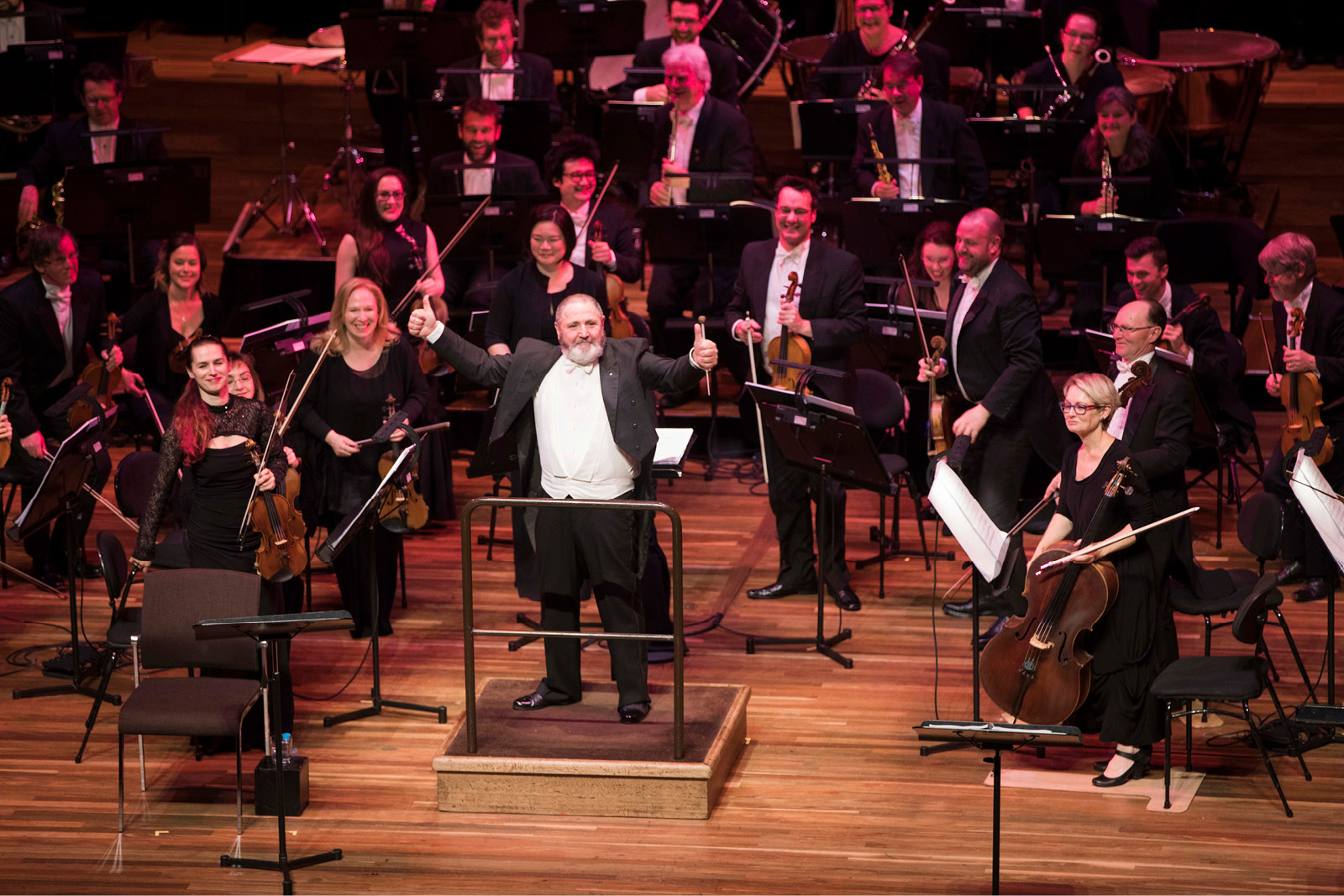It was mesmerising, the first time I became of aware of Richard Mills. Back in the 70s, I was attending a Queensland Symphony Orchestra concert in Brisbane City Hall when the percussionist took up the cymbals and dramatically held them apart for what seemed like an eternity before bringing them together at exactly the right moment. My teenage self thought this attention-seeking behaviour was pretty cool. If memory serves, a few years later, Richard’s arrival in a smart red sports car at the ABC Ferry Road studios for a schools’ concert also impressed.
 Richard Mills conducting Victorian Opera’s The Capulets and The Montagues in 2018. Photo © Charlie Kinross
Richard Mills conducting Victorian Opera’s The Capulets and The Montagues in 2018. Photo © Charlie Kinross
What impresses now is the breadth and depth of Mills’ professional activity over the intervening years. Composer, conductor, arranger, artistic director and mentor – all of these roles he has acquitted with distinction. Reaching his seventieth birthday last month, it was only right, therefore, that he get together with his friends and collaborators to celebrate his achievements, make music and have a bit of fun.
This celebratory concert of Mills’ music was a real feast, bringing together some of Australia’s most distinguished singers, other fine solo performers with Orchestra Victoria and compere Phillip Sametz, all of whom donated their services for the evening.
Raising the curtain were Three Songs for Buddy, the composer’s cabaret-style tribute to his dog, sung winningly by Robyn Archer. Although different in style from the preceding songs, two movements from Mills’ String Quartet No 4 played by the Partridge Quartet (one evoking a wombat’s dream and the other an “anti-tango”) confirmed that the composer is quite adept at putting is tongue in his cheek.
Much of Mills’ work has involved the human voice and the range of expression in his vocal music is extraordinarily broad. Elizabeth Campbell and Phoebe Briggs were perfectly partnered in two art songs, from Songs after Judith Wright while baritone Simon Meadows (standing in at short notice for an indisposed Teddy Tahu Rhodes) delivered a moving first performance of In Tempore Bello. This set of five songs with orchestral accompaniment was written in 2008 as a tribute to a schoolmate who died tragically yet heroically in the Vietnam War.
Opera has been a major part of Mills’ life and the sextet and quartet from Summer of the Seventeenth Doll reveal his remarkable flexibility of style. The sextet (sung by Rebecca Rashleigh, Kathryn Radcliffe, Roxane Hislop, Elizabeth Campbell, Timothy Reynolds and Stephen Marsh) cleverly delineates contrasting characters while firmly situating the action in time and place, while the quartet is a particularly moving evocation of nostalgia and pathos.
Greta Bradman brought sunshine as she sang two song arrangements. Early One Morning had a touch of Canteloube’s Chants d’Auvergne about it, while Every Day is a Rainbow Day for Me channelled the popular music of the 1930s. Bradman’s grandfather, who wrote the latter, would surely have been pleased with the result.
Mills’ spirituality was aptly celebrated in Three Antiphons of Hildegard of Bingen, sung with great conviction by Merlyn Quaife, who deftly navigated their melismatic intricacy. The Nightingale’s Aria from the 2007 opera, The Love of the Nightingale was hauntingly delivered by Emma Matthews, forming a great contrast with Carlos E. Bárcenas’ dramatic delivery of I piango, i’ardo from Songs of Fire and Iron, a 2008 cycle of Michelangelo settings.
A fitting break from vocal music came with the Canzona from the Concerto for Two Violins, sensitively performed by soloists Markiyan Melnychenko and Aidan Filshie. Once again, Mills’ gift for plangent but heart-warming lyricism impressed.
How to bring such an evening to a close? Vaughan Williams provided the perfect solution in his Serenade to Music. Matthews, Quaife, Radcliffe, Rashleigh, Bradman, Campbell and Hislop were joined by Dimity Shepherd; and Bárcenas, Reynolds, Meadows and Marsh were joined by Douglas Kelly, Brenton Spiteri, Raphael Wong and Warwick Fyfe to form the group of 16 soloists. RVW’s luminous setting of words from Act V of The Merchant of Venice was the perfect summation of the evening’s aspirations – that the writing and performing of music be a precious, life-affirming activity that brings people together. May Richard Mills long continue to do exactly that!











Comments
Log in to join the conversation.